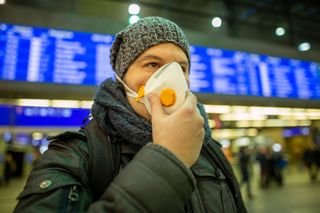Bias
Societal Reflections of the Recent Pandemic
Why intolerance grows in times of crisis and what we can do about it.
Posted March 15, 2020 Reviewed by Lybi Ma

On 11th March, Coronavirus (COVID-19) had been classified as a pandemic by the World Health Organization. Recently in the news, we have seen a rise in reported cases of intolerance, xenophobia, prejudice, and physical aggression, all related as responses to the pandemic. For example, Jonathan Mok, an East Asian student, was assaulted in London in a racially aggravated assault, where the attacker was reported as saying “I don't want your coronavirus in my country."
Perhaps more common, are the increased cases of panic buying. Toilet roll, pasta, tinned goods, and hand sanitizes are typical items that are being fought over in the shopping isles. Societal rule obeying relies largely on public trust that all aspects of society can remain in tack. In sociology, the effective functioning of society based on the trust of the networks and relationships among people is called social capital. Public fear can lead to society breaking down, where public trust is lost1.
Many of us may have seen the 2001 movie, "A Beautiful Mind," which depicted the life of John Nash, who identified that in competitive situations there are always losers. He developed the Nash Equilibrium, and the idea of studying behavioral dynamics through competitive games, now known as game theory. Through this, he demonstrated that cooperation can be more beneficial to parties in many cases as opposed to protective behavior. However, his theory works great theoretically, but in reality, this can be quickly lost in a society that is panic-stricken as a result of a global disaster. Indeed, psychologists Amos Tversky and Daniel Kahneman won the Nobel prize in economics for their work on prospect theory and developing the field of behavioral economics, demonstrating that people are naturally loss aversive and irrational2. Panic and fear of loss of a normal standard of living may be one explanation for the decay of community values seen, as greater intolerance begins to show its ugly head.
Of course, there are many within the community, who develop stronger community values and spend countless hours trying to help others. Psychological theories of more effective group cooperation, collaboration, goals, ideals, and connection that foster greater well-being for its members are being developed today such as through utilizing multi-level level selection theories of evolutionary psychology and functional contextual psychological approaches3. These approaches demonstrate, we already have within us the necessary ingredients to form efficient and cooperative communities, even in a crisis situation.
There may be many reasons for intolerance. In psychology, some examples relate to how we categorize information as a means to form cognitive shortcuts. These come in the form of, for example, stereotyping, which are generalized beliefs about a particular group of people such as entrepreneurs are ambitious, politicians are boring, and doctors are intelligent. These over-simplistic generalizations are exactly that, general assumptions that may not be true, and depending on whether they are positive or negative about a social grouping, can affect how we behave towards that social group (whether conscious or unconscious). Crucially, these are learned as part of our socialization process.
Prejudice is a negative judgment made towards a person or group of people without really knowing them and can be based upon stereotype knowledge or other information learned about the person or persons. Discrimination and intolerance are often justified by the perpetrators and are examples of prejudice in practice. Discrimination occurs in many forms and targets many groups, such as against religion, ethnic groups, sexual orientation (homophobia) and gender. In society, greater awareness of this discrimination as being unacceptable is, thankfully, today, more pronounced, and rights protecting, for example, lesbian, gay, bisexual, and transgender (LGBT) groups have been growing and are more enforced.
Despite these positive societal steps of progressive and liberal tolerance, in times of panic, intolerance seems to grow and is magnified. One form of intolerance which been magnified with the onset of the current pandemic is xenophobia. This is prejudicial behavior related to the false belief that people from other countries are a threat. This unfortunately, at least partly explains the increased number of attacks against people of East Asian appearance in the UK and around the world as coronavirus originated from Wuhan, China.
How do we counteract discrimination, xenophobia, and intolerance towards others within society, and in times of crisis? Some of the obvious ways are enforcing laws which punish people who act in intolerant ways. Another way, are educational programmes that raise awareness about the mechanisms of intolerance, prejudice, and even unconscious bias. Third, perhaps greater activity by civil society to denounce discrimination and prejudice.
However, though these are all excellent measures, these are mechanisms driven by legal, educational, governmental, and societal institutions. What can we do closer to home and at an individual level to promote a kinder and more cooperative society in times of crisis? How we can reduce our own conscious or unconscious biases and perhaps intolerance for other human beings?
In psychology, there are many exercises one can take to increase mindfulness and compassion towards others. For example, one study showed that by adding a 12-week mindfulness-based kindness curriculum4 increased more prosocial behavior amongst schoolchildren, such as increased empathy and cooperation. However, those who did not receive the kindness curriculum developed more selfish behavior. Perhaps another positive step is to start with yourself.
Kindness and tolerance toward others as well as well-being can stem from being kind to yourself5. Self-compassion stands on three pillars.
- Self-kindness, which is treating yourself with kindness and understanding
- Common-humanity, which is recognizing that you are not alone in your pain and suffering, we all can experience fear and pain
- Mindfulness, which is holding the negative thoughts just as they are, without trying to change them, trying to suppress them, and without judgment.
Building self-compassion builds resilience, optimism, and a healthier response to panic, stress, anxiety, and depression6.
Unfortunately, many people have not been educated in schools about how to cope with their emotions. As a result, they do not know how to relate to, connect to, and cope with their emotions and fear-provoking thoughts. Perhaps it should be governmental responsibility to ensure such education, in a recognised curriculum, is formed—a 12-week mindfulness-based kindness curriculum or other types that promote mindfulness and value orientation over impulsivity and selfish intent.
Of course, the COVID-19 pandemic is real, scary, and needs a serious and effective societal response, such as the information given about social distancing and hand washing. However, social distancing should not mean social disconnection and intolerance. Hoarding toilet rolls and canned goods take away from another person who may be in need. Learning to adjust, cooperate, and cope with our fears, through increased psychological flexibility, resilience, and common connection and humanity may be more productive and effective at a community level.
We can learn many things from this recent pandemic. For example, the next time we choose to cast judgment on people from a foreign nation, displaced by war, risking their lives to desperately reach our shores and migrate here, perhaps, remember, when we were fearful for the safety of our families, we resorted to fighting over toilet paper and baked beans. Indeed, we need greater societal and global compassion. Intolerance perpetuates intolerance, and we need to break the cycle.
References
1. Berman, H. J. (2006). Public trust and good governance: An essay. INQUIRY: The Journal of Health Care Organization, Provision, and Financing, 43(1), 6-9.
2. Tversky, A., & Kahneman, D. (1991). Loss aversion in riskless choice: A reference-dependent model. The quarterly journal of economics, 106(4), 1039-1061.
3. Atkins, P. W., Wilson, D. S., & Hayes, S. C. (2019). Prosocial: using evolutionary science to build productive, equitable, and collaborative groups: New Harbinger Publications.
4. Flook, L., Goldberg, S. B., Pinger, L., & Davidson, R. J. (2015). Promoting prosocial behavior and self-regulatory skills in preschool children through a mindfulness-based kindness curriculum. Developmental psychology, 51(1), 44.
5. Beaumont, E., Durkin, M., Martin, C. J. H., & Carson, J. (2016). Compassion for others, self-compassion, quality of life and mental well-being measures and their association with compassion fatigue and burnout in student midwives: A quantitative survey. Midwifery, 34, 239-244.
6. Neff, K., & Germer, C. (2017). Self-Compassion and Psychological. The Oxford handbook of compassion science, 371.




